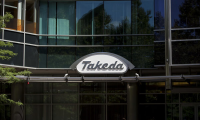-
Takeda, Astellas & Sumitomo Mitsui Form Joint Venture to Lift Japanese Innovation From ‘Valley of Death’
- Source: https://medcitynews.com/author/fvinluan/
- 92
- May 2, 2024
-
FDA Approves Takeda’s Subcutaneous Form of Entyvio as a Maintenance Therapy in Adults with Moderately to Severe Crohn Disease
- Source: drugdu
- 104
- April 23, 2024
-
FDA Grants Accelerated Approval to Takeda’s Iclusig for Ph-Positive Acute Lymphoblastic Leukemia
- Source: drugdu
- 158
- March 21, 2024
-
AstraZeneca Acquisition Brings Drug to Fill a Rare Disease Gap Left by Takeda
- Source: drugdu
- 155
- March 18, 2024
-
Takeda picks up 2nd FDA-approved indication for immune globulin treatment HyQvia
- Source: drugdu
- 153
- January 18, 2024
-
Novartis drops subpoena request in trade-secret spat with Takeda
- Source: drugdu
- 112
- November 24, 2023
-
Takeda’s enzyme replacement therapy approved by FDA for rare blood clotting disorder
- Source: drugdu
- 96
- November 16, 2023
-
Takeda’s Fruzaqla receives FDA approval for metastatic colorectal cancer
- Source: drugdu
- 96
- November 14, 2023
-
Takeda Wins FDA Approval for Fruquintinib in Certain Colorectal Cancer Patients
- Source: drugdu
- 108
- November 13, 2023
your submission has already been received.
OK
Subscribe
Please enter a valid Email address!
Submit
The most relevant industry news & insight will be sent to you every two weeks.













